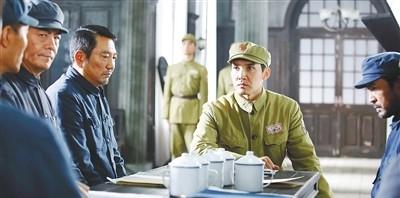In 1949, when the Liberation War was in full swing, there were many prisoner-of-war camps throughout the country, and there were about a thousand senior Kuomintang war criminals, and their emotions were extremely unstable, which caused a lot of pressure on the care units.

Luo Ruiqing, minister of public security, reported these situations to the central authorities, and Mao Zedong instructed that these war criminals should be treated sick and injured, given political study, participated in labor reform, and then dealt with according to the actual situation when the time was ripe.
Zhou Enlai suggested that the work of reforming war criminals be handed over to the public security department, and asked Luo Ruiqing to organize and implement it immediately, and the Beijing Gongdelin War Criminals Management Institute was established in this context.
In the spring of 1949, Liu Yazi, Xu Zhucheng, Ye Shengtao, and dozens of other patriotic democrats visited the Shandong Liberated Area and visited the East China People's Liberation Army Officer Training Corps, which is often referred to as a prisoner-of-war camp.
At that time, the East China Bureau and the East China Military Region were stationed in Qingzhou, Shandong, and the PLA Officer Training Corps was also here
Xu Zhucheng, a famous newspaperman and chief writer of Wen Wei Po, accidentally met his old acquaintance Wang Yaowu in Qingzhou.
Xu Zhucheng visited the captured officers' dormitory, a large pit in one room, warm and clean, neatly futoned, and complete tables and chairs.
Wang Yaowu lives alone in a room with better furnishings, a wardrobe, tables and chairs.
After Xu Zhucheng and Wang Yaowu had a brief quarrel, they asked him if he was accustomed to living? Do you feel uncomfortable?
Wang Yaowu's answer was very solid and interesting: "Since I was captured, they have never scolded or insulted us, but only advised us to study hard. The Communist Party of my position is going to be caught by us and has long since lost its life, and now that people treat us like this, we only feel ashamed in our hearts.
You ask me if I can eat well in life? People like us, who used to open their mouths when they ate, stretched out their hands in their clothes, and didn't stick to any grass, now have to work on their own, make their own beds, wash their own clothes, sweep the floor by themselves, and go to cook by themselves, of course, they are not used to it. But think about it, what is the purpose of life? Is it only for the exploitation of other people's labor to enjoy your own happiness? Thinking of this, my heart was calm and I studied with peace of mind. ”
Xia Yan, who was in charge of cultural work in East China, also visited the Qingzhou People's Liberation Army Officers Training Corps, where the correctional officers called all the Kuomintang generals in the training group "classmates," but some prisoners of war thought that this was the "hypocrisy" of the Communist Party.
Xia Yan said: "The defeated side is captured by the victorious side, and it is a matter of course to call it a prisoner. But why not call a prisoner a classmate? That is not hypocrisy, but embodies the communists' ambition to transform the world as their own responsibility.
You are not being abused here, but receiving preferential treatment, and everyone is studying together, discussing the truth together, and studying how the Chinese nation can be rejuvenated. If some of you think that calling classmates is a trick, then we can suggest that in the future, we will no longer call classmates, but call prisoners. ”
Wang Yaowu's old partner in Shandong, Pang Jingtang, chairman of the Kuomintang Shandong Provincial Party Department, suffered similarly to Wang Yaowu, who escaped disguised as a refugee in the artillery fire of the Jinan Campaign, was captured by plainclothes troops of the People's Liberation Army in Lincheng, and then sent to Qingzhou.
After arriving at the Qingzhou Training Regiment, Pang Jingtang first saw a couplet: "Come in early and come in late, come in early and come in early; go out first and then go out successively." The horizontal batch is "you are also coming".
Later, he learned that the couplet was written by Wang Yaowu, who "came in" more than ten days before him, and the two were organized in a group. Although he was captured, Pang Jingtang could not forget to do Wang Yaowu's "ideological work" frequently.
Later, they all came to Gongdelin in Beijing, which also became the beginning of a new life.